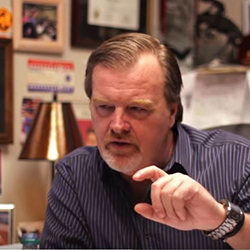Front Matter
Marc Cooper
Managing Editor, eJournal of Public Affairs
Missouri State University
(Opening Essay: eJournal of Public Affairs, Volume 4, Issue 3)
This issue completes the fourth volume of the eJournal of Public Affairs and the second issue published on the new eJournal website. The new platform uses Open Journal Systems (OJS) to integrate the process of author submission, peer review, copyediting, layout, and publication. The system works so well that I can usually give authors a publication decision within 45 days of submission.
While OJS facilitates many aspects of publication, moving from a “flat” website to dynamic journaling software has not been simple. We previously published in both HTML format and PDF. We will now publish articles in PDF only, in a layout that we hope produces readable onscreen and print text. We will continue to publish media submissions in HTML. Also, we are reformatting our archive—a tedious process—to reflect our new publication style sheet.
Once we have completed the transition, the editorial team plans to improve the status of the eJournal within the academic community. We will be adding digital object identifiers (DOIs) to the metadata associated with published items, including those in the archive, which will make citing and finding our items much easier. Moreover, the use of DOIs will allow future researchers to find relevant articles and entire themed issues. We also plan to deposit eJournal issues in the LOCKSS (Lots of Copies Keeps Stuff Safe) digital repository to create permanent correct copies of our authors’ work. In fact, once an issue is deposited in LOCKSS, its existence is insured even if the journal itself ceases publication and the website disappears. Finally, we plan to expand the number of sites that index the eJournal. Taken together, the editorial team has taken on quite a bit, but we believe that we can complete this process by the spring of 2016.
In this issue, Sheila Suess Kennedy suggests that civic literacy is a “wicked problem.” One of the characteristics of wickedness is that the resources to resolve it change over time. In this case, No Child Left Behind had the unintended effect of relegating the social sciences to a lower tier of the secondary education
OPENING ESSAY: FRONT MATTER
curriculum. While the Department of Education spent nearly a billion dollars on American history programs between 2001 and 2011, building capacity in civic literacy was never part of the annual request for proposals. Still, funds from the programs supporting history education and History Day did provide some support for projects related to civic learning. However, by fiscal year 2011, these funds dried up. In hindsight, that was wicked.
This is not to say that civic learning has disappeared from the curriculum. In this issue, Bethany Fleck, winner of the John Saltmarsh Award for Emerging Leaders in Civic Engagement, and her colleagues at Metropolitan State University of Denver use carefully constructed and outcomes-assessed service-learning courses to develop democratic civic values and public problem-solving skills in their students. Meanwhile, Windy Lawrence and her colleagues argue that universities can use dialogue and deliberation to introduce democratic learning into the curriculum while strengthening connections between institutions and the neighborhoods in which they exist. Jason Fruth and his colleagues at Wright State University show that a carefully developed service-learning course improved the cultural competence of pre-service teachers. Finally, Shyam K. Sriram, now at the University of California, Santa Barbara, highlights the results of a panel discussion at the 2014 Midwest Political Science Association. Six panelists, all political scientists from a variety of institutions, outline some of the most interesting and successful civic engagement projects at their respective campuses. Nearly all of them are aimed at improving student civic and democratic learning.
That these articles, though independently submitted, address closely related issues is serendipitous but not entirely unexpected. Because the eJournal collaborates with the American Democracy Project (ADP), with which many of our authors are associated, and because civic learning is at the heart of ADP’s mission, we expect and welcome continued submissions in this area. Still, this issue focuses primarily on the role of service-learning in institutions of higher education. There are many other related issues to explore. We have several themed issues planned for 2016 including one on social justice and another on the intersection of higher education and political life. Moreover, the resurgence of student activism is a welcome sign of renewed interest in public democratic values. We welcome submissions examining all of these topics for both themed and open issues.


